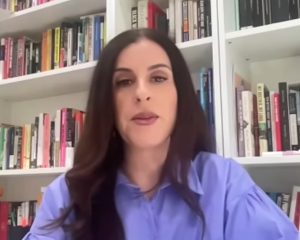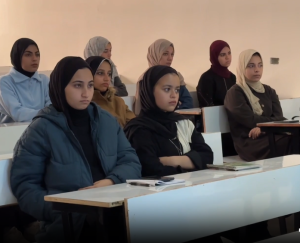16 October 2025
Once again, senior administrators of a major British university appear to be living in a bubble within which mention of the genocide in Gaza has yet to reach them. Undergraduate students inside and outside the Oxford Union have been shouting from the rooftops to divest and boycott, but it seems the administrators can’t hear them or choose not to, as this report in the Middle East Eye explains.
Oxford University invested in at least 49 firms linked to illegal Israeli activity
Campaigners say the holdings raise questions about how the rest of Oxford’s vast wealth is invested, much of it hidden from public scrutiny
By Dania Akkad
Published date: 16 October 2025 13:56 BST |
Oxford University is indirectly invested in at least 49 companies that have been flagged by the UN and human rights organisations for their involvement in illegal Israeli activities in occupied Palestinian territories, analysis by Middle East Eye has revealed.
While the value of the holdings – currently worth more than £19m ($25.5m) – amounts to a small proportion of Oxford’s total £8bn endowment, campaigners say it raises questions about the university’s commitment to its own ethical guidelines, as well as concerns about how the rest of its wealth, much of it hidden from public scrutiny, is being invested.
Oxford’s investments in the companies are made through a passive equity tracker fund which BlackRock, the world’s largest asset manager, and the university developed in 2020 to screen out firms involved in fossil fuels and controversial weapons.
But the index does not exclude those listed on a UN database of companies found to be complicit in violating Palestinian human rights through their ties to illegal Israeli settlements, nor those on the Boycott Divestment and Sanctions (BDS) campaign’s divestment shortlist.
Holdings include four major Israeli banks, travel-sector companies like Expedia Group, Booking Holdings Inc and Airbnb, Inc and US technology company Motorola Solutions which were all named in an updated iteration of UN database.
Israel’s largest arms company Elbit Systems Ltd, Palantir Technologies, Rolls-Royce Holdings, IBM Co and Valero Energy Corp, each on the BDS shortlist, are also in the fund’s portfolio.
The Oxford BDS Coalition, which includes students and staff at the university, told MEE: “It is completely unacceptable for the University of Oxford to be involved in illegal activities of any kind. Even more so for the university to profit from an illegal occupation that has been linked to egregious human rights abuses, including genocide, the most abhorrent of all crimes.
‘The university has been made aware of these links on numerous occasions, so we have to assume that they are knowingly complicit in these crimes against humanity’
– Oxford BDS Coalition
“The university has been made aware of these links on numerous occasions, so we have to assume that they are knowingly and willingly complicit in these crimes against humanity.”
The coalition has called on the university to disclose a comprehensive account of its investment holdings, and divest from all direct and indirect holdings in arms companies and companies linked to illegal Israeli activity in the occupied Palestinian territories.
“There are now hundreds of University’ members who have committed to the terms of the Boycott, Divestment, and Sanctions movement, many of them senior academics who are concerned about the legality of Oxford’s investments,” the coalition said.
“The university should immediately end its ties with companies complicit in violating human rights and international law.”
Oxford’s investment in an index tracker – which involves funds being invested across a spread of companies according to pre-determined criteria as opposed to individual shares being selected at an investor’s discretion – is not unusual.
When MEE contacted Oxford for comment, a university spokesperson noted that many institutions, pensions funds and other pools of capital use index trackers or passive investment.
But the investment, which the university said represented less than two percent of its total investments, is particularly notable because Oxford helped develop the fund.
Oxford and BlackRock
With the largest endowment of any university in the UK, Oxford would be in a good position to push for change across the entire sector, said Saqib Bhatti, executive director of the US-based Action Center on Race and the Economy.
“If the biggest universities like Oxford were to band together and play a leadership role with other universities in the world with large endowments to say we need to make sure that our investments are mission-aligned and we need to make sure that asset managers are offering mission-aligned options for all universities, they could make that happen,” Bhatti said.
MEE asked Oxford if it could work with BlackRock on the fund to further screen for companies complicit in illegal Israeli activity.
A university spokesperson directed MEE to BlackRock’s website for information about screening and to the university’s Ethical Investment Restrictions which are outlined in its Investment Policy Statement.
According to the policy, those restrictions include direct investments in arms manufacturers, tobacco companies, fossil fuel exploration and extraction companies, or investment in funds which invest primarily in any of those categories.
MEE asked Oxford how its nearly £10,000 indirect investment in Elbit Systems, which has reportedly supplied the Israeli military with missiles, drones, munitions and artillery systems, aligned with the university’s intent to avoid investment in controversial weapons, but did not receive a direct answer.
BlackRock declined to comment on the record about the fund and did not answer whether, more generally, the firm could screen for companies involved in Israeli occupation if clients requested it.
Noam Perry, strategic research coordinator for the US-Based American Friends Service Committee, which tracks corporate complicity in state violence, said it was “admirable” that Oxford had placed investment restrictions on itself based on ethical grounds.
But he added that it was “high time to expand these criteria to include companies that consistently, knowingly, and directly enable or facilitate genocide, apartheid, or other war crimes and crimes against humanity.
“Investing in such companies is clearly inconsistent with the education and research objectives of the university. Implementing such an investment restriction would be as easy for Oxford as it has been to implement its existing restrictions,” Perry said.
Push for transparency
Both the university and BDS coalition members on campus emphasise that the amount of money that Oxford has invested in the BlackRock fund is very small compared to the university’s total endowment.
But the coalition, which first uncovered and analysed the fund, says it is important because the vast majority of the rest of the university’s company-level holdings have not been disclosed.
The group points specifically to the Oxford Endowment Fund (OEF), an investment vehicle in which the university, most of its colleges and several external UK charities pool their capital, which the coalition says “dwarfs the fund investigated in this article”.
‘The endowment of the collegiate university is the largest endowment in the UK, however no information is publicly available about the investments of this fund’
– Oxford BDS Coalition
“The [OEF] is worth over £7bn as of the most recent report from its manager, Oxford University Endowment Management (OUEM). The University of Oxford isn’t the only investor in this fund. Thirty-one Oxford colleges also invest through this fund along with several other trusts and foundations,” the group said.
“The endowment of the collegiate university is the largest endowment in the UK, however no information is publicly available about the investments of this fund at a company-level.”
The lack of information comes despite over 150 Freedom of Information requests, including to the university’s colleges, which the coalition has filed in the past two years.
“Through freedom of information requests the Oxford BDS Coalition has learned that the University and colleges who invest through this fund do not hold this information,” the coalition said.
“The Oxford BDS Coalition is currently appealing a decision by the Information Commissioner’s Office which allows OUEM not to publicly disclose any information beyond what is in their standard reporting, and prevents scrutiny of investments in the largest university endowment fund in the UK.”
Wave of pressure
Revelations about Oxford’s investments come with Israel widely accused, including by the UN’s top legal investigative body, of waging a genocidal campaign against Palestinians in Gaza during a two-year war halted this month by a US-brokered peace deal with Hamas.
Amid a mounting international outcry, in recent weeks Israel has faced calls to have its national and club football teams barred from European competition and for its participants to be banned from the 2026 Eurovision Song Contest.
Norway’s sovereign wealth fund, the largest in the world with $2 trillion worth of investments in more than 8,600 companies, divested from US construction manufacturer Caterpillar and five Israeli firms – including three banks held in the BlackRock fund – over human rights violations.
ABP, the largest Dutch pension fund, soon followed, announcing earlier this month that it too had divested from Caterpillar over concerns about the use of the company’s equipment by Israel in Gaza.
In July, UN Special Rapporteur Francesca Albanese released a report which described an ecosystem of companies sustaining Israel’s occupation and genocide, and called on 60 named companies to cease their dealings with Israel.
She specifically noted the role that asset managers like BlackRock and Vanguard play as some of the largest institutional investors in many of the companies she named.
“Through their asset management, they implicate universities, pension funds and ordinary people who passively invest their savings through the purchase of their funds and electronically traded funds [sic],” she wrote.
Asked about Oxford’s BlackRock investments by MEE earlier this year, she encouraged the university to divest from the flagged firms.
“By the very fact that you stay engaged in companies and in a sector and an ecosystem that is punctuated by international crimes after international crimes enmeshes you into liability,” she said.
University campuses across the UK have been focal points for pro-Palestinian activism and boycott campaigns over the past two years, with various related divestments made at Queen’s University Belfast, King’s College Cambridge and Swansea University among others.
Bhatti reflected on the destruction of the education sector in Gaza over the past two years, suggesting that Oxford should re-consider its purpose.
“They’ve destroyed every university in Gaza. They are destroying centuries of scholarship and cultural sites,” he said.
“You don’t exist to make money. You exist for a mission: to provide education.”












